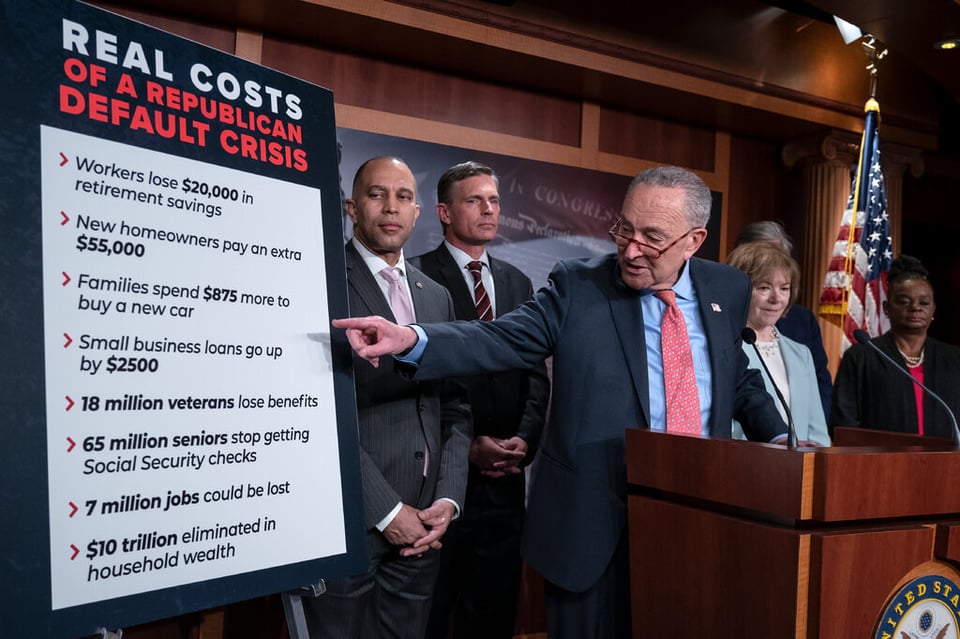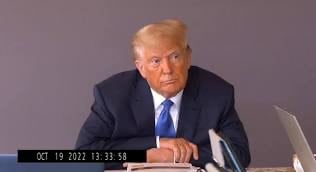Tuesday, May 9, 2023. Annette’s News Roundup.
I think the Roundup makes people feel not so alone.
To read an article excerpted in this Roundup, click on its blue title. Each “blue” article is hyperlinked so you can read the whole article.
Please feel free to share.
Invite at least one other person to subscribe today! buttondown.email/AnnettesNewsRoundup
________________________________
Joe is always busy.
President Biden’s first one to one interview since announcing his decision to run for re-election in 2024 was with MSNBC’s Stephanie Ruhle last Friday night.
Walking in to host a special early edition of the @11thHour. Starting at 10 PM ET @MSNBC. pic.twitter.com/XEpwFwehQS
— Stephanie Ruhle (@SRuhle) May 6, 2023
Touch 👇 to watch the President speak about his Age.
EXCLUSIVE: @POTUS on his age and the 2024 campaign: "I have a acquired a hell of a lot of wisdom... I think I've proven myself to be honorable as well as also effective." pic.twitter.com/jVG5ZBCrLy
— 11th Hour (@11thHour) May 5, 2023
Touch 👇 to watch the President speak about his Vice President.
.@POTUS: "I just think that Vice President Harris hasn't gotten the credit she deserves." pic.twitter.com/B8iM55kZ0r
— 11th Hour (@11thHour) May 6, 2023
Susan Rice has left. Here is the President’s choice to replace her.
Biden picks Neera Tanden as top domestic policy adviser https://t.co/JCi2GxIFEB pic.twitter.com/qwfADnVYLV
— The Last Word (@TheLastWord) May 6, 2023
Biden wants airlines to pay passengers whose flights are hit by preventable delays
No airline currently offers cash compensation in addition to refunds or amenities. The White House plans to change that. The move comes after a chaotic holiday travel season. (NPR).See below.
We launched a new website: https://t.co/m69LNETq5Z.
— President Biden (@POTUS) May 8, 2023
It shows what airlines guarantee you when your flight is delayed or cancelled because of their mistake.
And we're expanding it to show which airlines offer further compensation like cash, miles, or travel vouchers.
And this year, my Administration will propose a rule that would make airlines cover meals, hotels, taxis, and rebooking fees – and provide compensation when they're the ones to blame for a cancellation or delay.
— President Biden (@POTUS) May 8, 2023
That’s all on top of refunding your ticket.
Joe has much to boast about.
Here’s a look at what was happening in the U.S. the last time the unemployment rate was this low. pic.twitter.com/ywv9UFVUFH
— The White House (@WhiteHouse) May 6, 2023
The graduates at Howard University have won the Graduation Speaker Lottery.👇

________________________________
Kamala is always busy.
The President spoke in praise of the VP. See above. 👏👆.
Now Gen Z speaks too. See below.👇
Kamala Harris Approval Poll: Young Gen Z Voters Support VP A Lot.
Congratulations @KamalaHarris for reaching TWENTY MILLION followers on Twitter!! #Kamala202X #OnAMission pic.twitter.com/pQkZkMlWEm
— Madam Auntie VP Kamala Harris is THEE GOAT! (@flywithkamala) May 6, 2023
Thank you to @VP Vice President Kamala Harris who wrote a letter to us thanking Hawai‘i for our commitment to protect a women’s right to choose. pic.twitter.com/qhUsX9Yf7v
— Governor Josh Green (@GovJoshGreenMD) May 6, 2023
________________________________
Here is a poll by Trump’s favorite Pollster, Rasmussen.
It is early, but I hope it makes you feel better.
BREAKING @POTUS @JoeBiden's approval rating stands at 51% today according to a new poll from Trump's favorite polling firm, Rasmussen.
— Chris D. Jackson (@ChrisDJackson) May 8, 2023
51% approve
48% disapprove
Who else thinks the media should give positive poll numbers like these just as much attention as they do the… pic.twitter.com/d8Rh1RiYnV
_______________________________
Harvard Law School Professor Lawrence Tribe changed his mind.
Why I Changed My Mind on the Debt Limit by Lawrence Tribe.

Senator Chuck Schumer, the majority leader, and other congressional Democrats, criticizing Republicans for trying to block efforts to raise the debt limit.
At this moment, at the White House as well as the Departments of Treasury and Justice, officials are debating a legal theory that previous presidents and any number of legal experts — including me — ruled out in 2011, when the Obama administration confronted a default.
The theory builds on Section 4 of the 14th Amendmentto argue that Congress, without realizing it, set itself on a path that would violate the Constitution when, in 1917, it capped the size of the federal debt. Over the years, Congress has raised the debt ceiling scores of times, most recently two years ago, when it set the cap at $31.4 trillion. We hit that amount on Jan. 19 and are being told that the “extraordinary measures” Treasury has available to get around it are about to run out. When that happens, all hell will break loose.
Taking advantage of that prospect, congressional Republicans are threatening to do nothing unless the administration agrees to slash lots of government programs that their party has had in its sights. If the president caves in to their demands, they will agree to raise the cap — until this crisis occurs again. Then, they will surely pursue the same game of chicken or, maybe more accurately, Russian roulette. It’s a complicated situation, but a solution is staring us in the face.
Section 4 of the 14th Amendment says the “validity” of the public debt “shall not be questioned” — ever. Proponents of the unconstitutionality argument say that when Congress enacted the debt limit, effectively forcing the United States to stop borrowing to honor its debts when that limit was reached, it built a violation of that constitutional command into our fiscal structure, and that as a result, that limit and all that followed are invalid.
I’ve never agreed with that argument. It raises thorny questions about the appropriate way to interpret the text: Does Section 4, read properly, prohibit anything beyond putting the federal government into default? If so, which actions does it forbid? And, most important, could this interpretation open the door for dangerous presidential overreach, if Section 4 empowers the president single-handedly to declare laws he dislikes unconstitutional?
I still worry about those questions. But I’ve come to believe that they are the wrong ones for us to be asking. While teaching constitutional law, I often explored the problem of bloated presidential power, the puzzle of preserving the rule of law in the face of unprecedented pressures, and the paradox of having to choose among a set of indisputably bad options. During my last semester teaching, with Covid forcing my seminars from the classroom to the video screen, I studied the most insightful literature on the debt ceiling and concluded that we need to reframe the argument.
The question isn’t whether the president can tear up the debt limit statute to ensure that the Treasury Department can continue paying bills submitted by veterans’ hospitals or military contractors or even pension funds that purchased government bonds.
The right question is whether Congress — after passing the spending bills that created these debts in the first place — can invoke an arbitrary dollar limit to force the president and his administration to do its bidding.
There is only one right answer to that question, and it is no.
And there is only one person with the power to give Congress that answer: the president of the United States. As a practical matter, what that means is this: Mr. Biden must tell Congress in no uncertain terms — and as soon as possible, before it’s too late to avert a financial crisis — that the United States will pay all its bills as they come due, even if the Treasury Department must borrow more than Congress has said it can.
The president should remind Congress and the nation, “I’m bound by my oath to preserve and protect the Constitution to prevent the country from defaulting on its debts for the first time in our entire history.” Above all, the president should say with clarity, “My duty faithfully to execute the laws extends to all the spending laws Congress has enacted, laws that bind whoever sits in this office — laws that Congress enacted without worrying about the statute capping the amount we can borrow.”
By taking that position, the president would not be usurping Congress’s lawmaking power or its power of the purse. Nor would he be usurping the Supreme Court’s power to “say what the law is,” as Chief Justice John Marshall once put it. Mr. Biden would simply be doing his duty to “take care that the laws be faithfully executed” even if doing so leaves one law — the borrowing limit first enacted in 1917 — temporarily on the cutting room floor.
Ignoring one law in order to uphold every other has compelling historical precedent. It’s precisely what Abraham Lincoln did when he briefly overrode the habeas corpus law in 1861 to save the Union, later saying to Congress, “Are all the laws, but one, to go unexecuted, and the government itself go to pieces, lest that one be violated?”
For a president to pick the lesser of two evils when no other option exists is the essence of constitutional leadership, not the action of a tyrant. And there is no doubt that ignoring the debt ceiling until Congress either raises or abolishes it is a lesser evil than leaving those with lawful claims against the Treasury out in the cold.
Of course, my solution might roil the bond markets and cause lenders to demand a premium for extending credit to the United States. But no path out of the dilemma is without risk.
Some will say that letting the president ignore the statutory limit on borrowing would give him too much power and represent a dangerous step in a tyrannical direction. Wrong. What I propose would in truth give the president a lot less power than entrusting him to decide which of the government’s promises to honor and which creditors to stiff — a power that the Supreme Court denied him when it handed down a 1998 decisionthat prevented him from vetoing line items within a budget.
In any event, Section 4 prohibits the president from permanently stiffing our creditors — even those required to wait their turn after the Treasury runs dry. So even if Speaker Kevin McCarthy and those pulling his strings succeed in making some of those creditors wait, it wouldn’t eliminate our debts; it would merely replace them with i.o.u.s. And that’s just debt in another form.
All Congress would have done is create economic catastrophe on top of constitutional crisis — and without securing compliance with the debt ceiling that Republican claim to want. The only way out of this forest is through the trees. (New York Times).
________________________________
Yesterday were the final arguments in the Trump civil rape case.
The case is in the hands of a 9 person jury - 6 men, 3 women - which must vote unanimously to convict Trump.


E. Jean Carroll’s lawyer, Robbie Kaplan, summarized her case this way - believe E. Jean. Trump made clear his attitude toward women in his ‘grab her by the xxxxy’ Access Hollywood Tape. E. Jean was so much Trump’s type that he identified a photo of her as a photo of his wife, Marla Maples.
Trump’s lawyer said simply the case was made up. Legal commentators almost universally said Trump’s decision not to testify may well hurt him.
We await the verdict.

________________________________
The March to Reparations moves forward.
California black reparations panel OKs state apology, payments.
California’s historic reparations task force has voted to approve recommendations for possible payments to Black residents and a formal apology for the state’s role in perpetuating discriminatory policies.

OAKLAND, Calif. -- California's reparations task force voted Saturday to approve recommendations on how the state may compensate and apologize to Black residents for generations of harm caused by discriminatory policies.
The nine-member committee, which first convened nearly two years ago, gave final approval at a meeting in Oakland to a hefty list of proposals that now go to state lawmakers to consider for reparations legislation.
U.S. Rep. Barbara Lee, D-Oakland, who is cosponsoring a bill in Congress to study restitution proposals for African Americans, at the meeting called on states and the federal government to pass reparations legislation.
“Reparations are not only morally justifiable, but they have the potential to address longstanding racial disparities and inequalities,” Lee said.
The panel’s first vote approved a detailed account of historical discrimination against Black Californians in areas such as voting, housing, education, disproportionate policing and incarceration and others.
Other recommendations on the table ranged from the creation of a new agency to provide services to descendants of enslaved people to calculations on what the state owes them in compensation.
“An apology and an admission of wrongdoing just by itself is not going to be satisfactory,” said Chris Lodgson, an organizer with the Coalition for a Just and Equitable California, a reparations advocacy group.
An apology crafted by lawmakers must “include a censure of the gravest barbarities” carried out on behalf of the state, according to the draft recommendation approved by the task force.
Those would include a condemnation of former Gov. Peter Hardeman Burnett, the state’s first elected governor and a white supremacist who encouraged laws to exclude Black people from California.
After California entered the union in 1850 as a “free” state, it did not enact any laws to guarantee freedom for all, the draft recommendation notes. On the contrary, the state Supreme Court enforced the federal Fugitive Slave Act, which allowed for the capture and return of runaway enslaved people, until for over a decade until emancipation.
“By participating in these horrors, California further perpetuated the harms African Americans faced, imbuing racial prejudice throughout society through segregation, public and private discrimination, and unequal disbursal of state and federal funding,” the document says.
The task force approved a public apology acknowledging the state’s responsibility for past wrongs and promising the state will not repeat them. It would be issued in the presence of people whose ancestors were enslaved.
California has previously apologized for placing Japanese Americans in internment camps during World War II and for violence against and mistreatment of Native Americans.
The panel also approved a section of the draft report saying reparations should include “cash or its equivalent” for eligible residents.
More than 100 residents and advocates gathered at Mills College of Northeastern University in Oakland, a city that is the birthplace of the Black Panther Party. They shared frustrations over the country’s “broken promise” to offer up to 40 acres and a mule to newly freed enslaved people.
Many said it is past time for governments to repair the harms that have kept African Americans from living without fear of being wrongfully prosecuted, retaining property and building wealth.
Elaine Brown, former Black Panther Party chairwoman, urged people to express their frustrations through demonstrations.
Saturday's task force meeting marked a crucial moment in the long fight for local, state and federal governments to atone for discriminatory polices against African Americans. The proposals are far from implementation, however.
“There’s no way in the world that many of these recommendations are going to get through because of the inflationary impact,” said Roy L. Brooks, a professor and reparations scholar at the University of San Diego School of Law.
Some estimates from economists have projected that the state could owe upwards of $800 billion, or more than 2.5 times its annual budget, in reparations to Black people.
The figure in the latest draft report released by the task force is far lower. The group has not responded to email and phone requests for comment on the reduction.
Secretary of State Shirley Weber, a former Democratic assemblymember, authored legislation in 2020 creating the task force with a focus on the state’s historical culpability for harms against African Americans, and not as a substitute for any additional reparations that may come from the federal government.
The task force voted previously to limit reparations to descendants of enslaved or free Black people who were in the country by the end of the 19th century.
The group’s work has garnered nationwide attention, as efforts to research and secure reparations for African Americans elsewhere have had mixed results.
The Chicago suburb of Evanston, for example, has offered housing vouchers to Black residents but few have benefited from the program so far.
In New York, a bill to acknowledge the inhumanity of slavery in the state and create a commission to study reparations proposals has passed the Assembly but not received a vote in the Senate.
And on the federal level, a decades-old proposal to create a commission studying reparations for African Americans has stalled in Congress.
Oakland city Councilmember Kevin Jenkins called the California task force's work “a powerful example” of what can happen when people work together.
“I am confident that through our collective efforts, we can make a significant drive in advancing reparations in our great state of California and ultimately the country,” Jenkins said. (Associated Press).
________________________________
Another reason to be appalled by Elon Musk.
Twitter boss Elon Musk has reportedly slashed the company's paid parental leave offering from 20 weeks to just two, according to New York Times tech reporter Kate Conger.
In the same week that we at Glamour, in partnership with Paid Leave for All, launched our campaign to #passpaidleave in the US, Musk has reportedly done away with Twitter's competitive parental leave policy. This leaves the company well out of step with major tech corporations across the country, and strikes a huge blow at the entire workforce but particularly women, many of whom may be forced back to work bleeding and exhausted, in order to pay their bills and not fall into debt. (Glamour).
________________________________
The Republican Party stands for politics over people.
Occasionally a Republican votes with us, and therefore votes for the people. But we the people can’t count on it.
Here are 2 instances.
BREAKING: In a SHOCKING move, two Texas Republicans just joined the Democrats to PASS the “Raise The Age” gun control bill out of committee in the Texas Legislature!
— Jon Cooper (@joncoopertweets) May 8, 2023
That's right – TEXAS!
Don't ever let anyone tell you we can't win. Because we WILL.
The NRA is freaking… pic.twitter.com/VPVDteCNZD
Abortion ban rejected in South Carolina after GOP women join filibuster.
The South Carolina state Senate rejected a near-total abortion ban on Thursday, after the chamber’s five female lawmakers led a multiday filibuster against the bill.
Three Republicans, a Democrat and an Independent joined together as the only five women in the state Senate to block the legislation, which sought to ban abortion from conception with exceptions for rape, incest, fatal fetal anomalies and to save the life of the mother. (The Hill).
________________________________
Yesterday was a big day. As the President has reminded us, a free press is a pillar of democracy.
2023 Pulitzer winners in journalism, arts.

The Pulitzer Prizes recognizing the best of journalism and the arts in 2022 were announced Monday. The Associated Press compiled a list of winners in journalism, arts and letters, along with hyperlinks to their awarded works.
___
PUBLIC SERVICE: Mstyslav Chernov, Lori Hinnant, Evgeniy Maloletka, Vasilisa Stepanenko, The Associated Press
The quartet of AP reporters won for what the Pulitzers described as “courageous reporting” from the besieged city of Mariupol about the slaughter of civilians in Russia’s invasion of Ukraine. You can find a list of stories the team produced on our “Erasing Mariupol” page.
BREAKING NEWS REPORTING: The Los Angeles Times. The staff of the Los Angeles Times published a secretly recorded conversation among LA city officials that included racist comments, and then followed up with in-depth coverage of the aftermath.
INVESTIGATIVE REPORTING: The Wall Street Journal
The Wall Street Journal’s “Capital Assets” series analyzed the investments of about 12,000 federal officials and their families between 2016 and 2021. The Journal collected and analyzed data on about 850,000 financial assets and more than 315,000 transactions. This was a staff award.
EXPLANATORY REPORTING: Caitlin Dickerson, The Atlantic
The Atlantic’s Caitlin Dickerson conducted more than 150 interviews as part of an 18-month investigation into former President Donald Trump’s “zero tolerance” policy of child separation at the border.
LOCAL REPORTING: John Archibald, Ashley Remkus, Ramsey Archibald and Challen Stephens, AL.com; Anna Wolfe, Mississippi Today
There were two winners; they don't share the category, but instead each receive the full prize amount of $15,000. The AL.com, Birmingham, reporters won for a series of stories exposing how the police force in the town of Brookside preyed on residents to inflate revenue. The reporting freed people from jail, the outlet says, and resulted in resignations and new laws.
Mississippi Today reporter Anna Wolfe’s “The Backchannel” series detailed how state officials misspent millions in welfare money that was supposed to help some of the poorest people in the United States. Wolfe uncovered evidence that former Gov. Phil Bryant and NFL legend Brett Favre worked together to channel at least $5 million of the state’s welfare funds to build a new volleyball stadium at University of Southern Mississippi, where Favre’s daughter played the sport.
NATIONAL REPORTING: Caroline Kitchener, The Washington Post
Caroline Kitchener of The Washington Post wrote about the consequences of life after the Supreme Court ruling that overturned Roe v. Wade, including stories about women trying to navigate the aftermath.
INTERNATIONAL REPORTING: The New York Times
The staff of The New York Times won for their coverage of Russia’s invasion of Ukraine, including an investigation into Ukrainian deaths in the town of Bucha. The newspaper said the award was for “a mix of news and investigative articles about the conflict,” so there's no one link to provide.
FEATURE WRITING: Eli Saslow, The Washington Post
Eli Saslow won for what the Pulitzers called “evocative individual narratives” about people struggling with the pandemic, homelessness, addiction and inequality in the United States. Saslow has since left the Post, joining The New York Times in February. According to the Times announcement, he had been a finalist in this category thrice before and had previously won a Pulitzer for explanatory reporting.
BREAKING NEWS PHOTOGRAPHY: The Associated Press
A team of AP photographers won the Pulitzer for “unique and urgent” images of the first weeks of Russia’s invasion of Ukraine.
While it was a staff award, AP CEO Daisy Veerasingham wrote that the prize is shared among Rodrigo Abd, Bernat Armangue, Felipe Dana, Nariman El-Mofty, Vadim Ghirda, Evgeniy Maloletka and Emilio Morenatti. See a photo gallery of their work here.
FEATURE PHOTOGRAPHY: Christina House, Los Angeles Times
Christina House of the Los Angeles Times won for “an intimate look” into the life of a pregnant 22-year-old woman living on the street in a tent. It was part of a series called “Hollywood's Finest,” a look at the lives of three women without housing.
COMMENTARY: Kyle Whitmire, AL.com
Kyle Whitmire of AL.com, Birmingham, won for “State of Denial,” a series of what the Pulitzers called “measured and persuasive columns” that documented how Alabama’s Confederate heritage still lingers.
CRITICISM: Andrea Long Chu, New York magazine
Andrea Long Chu of New York magazine won for book reviews that employ “multiple cultural lenses” to explore societal issues, the Pulitzers said.
EDITORIAL WRITING: Nancy Ancrum, Amy Driscoll, Luisa Yanez, Isadora Rangel and Lauren Costantino, Miami Herald
The Miami Herald writers won for “Broken Promises,” a series of editorials on the failure of Florida public officials to deliver on taxpayer-funded amenities and services long promised to residents.
ILLUSTRATED REPORTING AND COMMENTARY: Mona Chalabi, The New York Times
New York Times contributor Mona Chalabi won for illustrations that combine statistical reporting with analysis to help readers understand the immense wealth and economic power of Amazon founder Jeff Bezos.
This prize replaced the editorial cartooning award last year, right on the heels of Pulitzer judges declining to name an editorial cartooning winner in 2021.
AUDIO JOURNALISM: Gimlet Media, notably Connie Walker
The award went to the staff of Gimlet Media, notably Connie Walker, whose “Stolen: Surviving St. Michael's” investigation into her father’s troubled past revealed a larger story of abuse of hundreds of Indigenous children at a residential school in Canada.
___
FICTION: “Demon Copperhead” by Barbara Kingsolver; “Trust” by Hernan Diaz
The two novels each won the fiction prize. “Demon Copperhead” is what the Pulitzers called a “masterful recasting of ‘David Copperfield,’” set in Appalachia. The citation described “Trust” as “riveting” and “a complex examination of love and power in a country where capitalism is king.”
DRAMA: “English” by Sanaz Toossi
Sanaz Toossi's “English” is a “quietly powerful play,” the Pulitzers said, centered on four adults preparing for an English exam near Tehran, Iran. The classroom drama explores the ways in which language shapes identity, experience and a sense of belonging in the world.
According to the Pulitzer website, the jury for this prize attends plays in New York and in regional theaters – while the award goes to the playwright, the actual productions of the shows are factored in.
U.S. HISTORY: “Freedom’s Dominion: A Saga of White Resistance to Federal Power,” by Jefferson Cowie
Jefferson Cowie won the history prize for a book that the Pulitzers describe as a “resonant account of an Alabama county in the 19th and 20th centuries shaped by settler colonialism and slavery” that illustrates the evolution of white supremacy.
Generally speaking, this is the only arts and letters — books, music, drama — award that can be awarded to someone who isn’t a U.S. citizen (but the book must be a history of the U.S.).
GENERAL NONFICTION: “His Name Is George Floyd: One Man’s Life and the Struggle for Racial Justice,” by Robert Samuels and Toluse Olorunnipa
The book by two Washington Post reporters is what the Pulitzers called an “intimate, riveting portrait” of George Floyd, the man whose murder by Minneapolis police officer in 2020 sparked an international racial justice movement. The Pulitzer board moved it from the biography category, a release says.
BIOGRAPHY: “G-Man: J. Edgar Hoover and the Making of the American Century,” by Beverly Gage
The prize was awarded to the “deeply researched and nuanced” biography of longtime FBI director J. Edgar Hoover, per the citation.
MEMOIR OR AUTOBIOGRAPHY: “Stay True” by Hua Hsu
Hua Hsu's memoir won this category for “an elegant and poignant coming of age account,” the Pulitzers said.
POETRY: “Then the War: And Selected Poems, 2007-2020,” by Carl Phillips
Carl Phillips' poetry won for what the Pulitzers called “a masterful collection that chronicles American culture.”
MUSIC: “Omar,” by Rhiannon Giddens and Michael Abel
“Omar” is an innovative and compelling opera about enslaved people brought to North America from Muslim countries," the Pulitzers said. It premiered last May at the Spoleto Festival USA in Charleston, South Carolina.
To award the musical competition prize, the website says the jury convenes in New York to listen to recordings and study the scores. (Associated Press, ABC News).
________________________________
My cousin Yitzi (Isaac) Zablocki, cofounder and director of the Film Festival, Reelabilities, changes the world, one film at a time.
Film festival explores stories of people with disabilities.

MANHATTAN, New York -- Celebrating the unique stories of the disabled community, the ReelAbilities Film Festival featured original films, a comedy night, an industry summit and powerful conversations about the narrative of disability in society.
In its 15th year, the festival ran from April 27 to May 3 at the Marlene Meyerson JCC Manhattan. The festival was fully accessible with ASL interpreters, visual descriptions and wheelchair access at all venues.
Co-founders Isaac Zablocki and Anita Altman created the festival with the intention of highlighting gifted storytellers and giving them an opportunity to have their work front and center in an industry that often overlooks disabled stories.
Zablocki said that as a filmmaker with a disability (he was diagnosed with dyslexia), he realized that disabled stories are told from one-dimensional perspectives. Now he says it's time for people with disabilities to show the world that their experiences are complex, emotional and human.
"My goal was to bring films to people that weren't being seen that needed to be seen," said Zablocki. More than three dozen films are featured in venues across New York City. Directors, writers and stars of the films are in attendance for many of the screenings.
The comedy night at Gotham Comedy Club featured standup by Victor Varnado, Mike Coytayo, Pavar Snipe, Charles Walden and Maysoon Zayid.
Sketch comedy was provided by the Ready, Willing and Funny Players. Improv was performed by UNIQUE and Irreverent.
The industry summit focused on panels discussing disability and inclusion in entertainment, media and fashion. The opening night included a red carpet event, a screening of the film "Unidentified Objects" and a special honor for Academy Award-winning actor Troy Kotsur.
Awarded the Oscar for best-supporting actor in the film CODA, Kotsur spoke about his life as a deaf person and how disability directly impacted his family. His father was paralyzed after an accident and his brother suffered a traumatic brain injury as a child.
Kotsur noted that growing up he never considered himself as disabled, but when his father and brother were injured they shared a special bond that uniquely shaped their family.
It's just been such an honor for all these celebrities not only to come to support the films but to really help support the message of ReelAbilities," said Zablocki.
The ReelAbilities Film Festival has grown into an international program, with events throughout the United States, Canada and Central America.
"Fifteen years later, we are the largest disability film festival in the world," Zablocki said.
Getting into the festival takes passion, creativity and true talent. Zablocki says great storytelling is the most important part of ReelAbilities. By crafting compelling stories, filmmakers are not just making films, they're changing the way people see and interact with disabled people.
"I'm waiting for the day where ReelAbililities is completely obsolete and there's no need for it because disability inclusion is everywhere," said Zablocki. (ABC News).
I am biased but I love watching this video of Yitzi talking about Reelabilities. You might have to unmute the sound when the video starts:
https://abc7ny.com/film-festival-reelabilities-disabled-community-disability/13214847/
________________________________